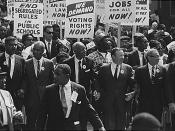Harper Collins Dictionary of Sociology. Ethnocentrism defines Ethnocentrism as "the attitude of prejudice or mistrust towards outsiders that may exist within a group (in-group) in relation to other (out-group)".... (Harper-Collin Dictionary of Sociology). There are three important levels of ethnocentrism: a positive one, a negative one, and an extreme negative one. The positive definition defines ethnocentrism as "the point of view that one's own way of life is to be preferred to all others" (Herskovits 1973: 21). There is nothing wrong with such feelings, because "it characterizes the way most individuals feel about their own cultures, whether or not they verbalize their feelings" (Herskovits 1973:21). This point of view gives people their sense of people-hood, group identity, and place in history. Ethnocentrism becomes negative when " one's own group becomes the center of everything, and all other are scaled and rated with reference to it"(Herskovits 1973:21). It reaches extreme negative form when "a more powerful group not only imposes its rule on another, but actively depreciates the things they hold to be of value" (Herskovits 1973:103).
This third level of ethnocentrism is found in examples of racial segregation, the holocaust, and genocide of a race of people.
Ethnocentrism is universal. Consumer ethnocentrism is what is used when trying to find out the consumers reaction to foreign products. Consumer ethnocentrism is defined by Shimp and Sharma (1987) as "beliefs held by consumers about the appropriateness or morality of purchasing foreign products" . If consumers think that purchasing imported goods will hurt the domestic economy, it not only has an effect on domestic employment, and is unpatriotic but the company that was thinking of introducing this new product to the consumer may have lost a great bit of money in doing so. . Ethnocentrism does not benefit the majority but can actually...


